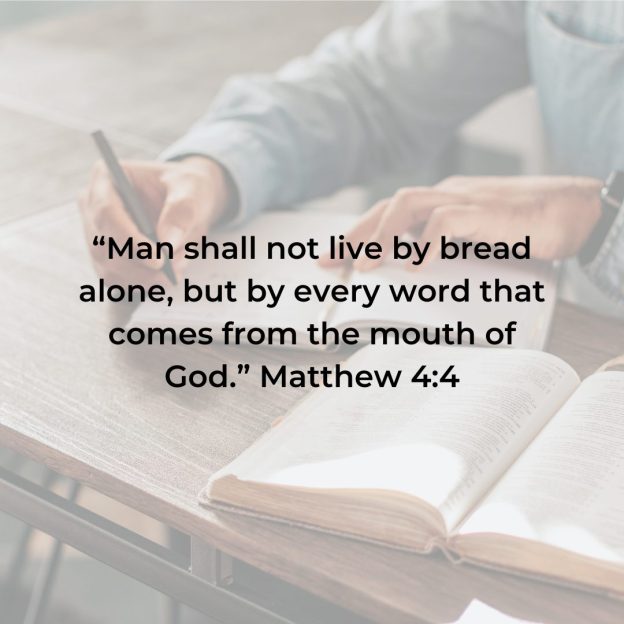How to Interpret the Bible: The Difference Between Exegesis vs Eisegesis

When we come to Scripture, we come not only to be informed, but to be transformed.
We come with an expectation that the Author of Scripture is going to speak to us, direct us, correct us, and restore us.
The writer of Hebrews states
For the word of God is alive and active. Sharper than any double-edged sword, it penetrates even to dividing soul and spirit, joints and marrow; it judges the thoughts and attitudes of the heart.1
Because the Word of God is alive and active, it’s important that we approach it with humility and intentionality.
And how we interpret Scripture is essential to understanding our faith and how our faith applies practically to our daily lives.
Dr. Jason DeRouchie, Professor of Old Testament and Biblical Theology at Midwestern Baptist Theological Seminary writes:
Interpreting Scripture faithfully necessitates that we view Scripture as God’s Word, assumes that Scripture’s truths are knowable, requires that we respond appropriately, and demands that we engage in the task depending on God.
Traditionally, there are two methods used in which to interpret Scripture:
- Exegesis
- Eisegesis
Let’s take a look at each of these methods in order to discern the best way we can approach and interpret Scripture.
What is Exegesis
Exegesis is a method used to interpret Scripture in which the meaning of the text is drawn out from within the text itself. This method of interpretation involves analyzing the historical, cultural, linguistic, and literary context of the Scripture to understand what the original author intended to communicate. Exegesis aims to uncover the author’s intended message by considering the Scripture’s original audience, as well as the cultural nuances of that historical period.
The purpose of exegesis is to avoid personal biases and preconceived notions, focusing instead on an objective interpretation of the Scripture.
Exegesis is often considered a more scholarly method of interpretation, as various factors are considered when interpreting a passage of Scripture.
What is Eisegesis?
Eisegesis, on the other hand, is more subjective in nature. This method involves reading one’s own beliefs, ideas, or interpretations into a text, rather than allowing the Scripture to speak for itself. When using eisegesis as our method, we approach the Scripture with preconceived notions and agendas, projecting our own perspectives onto the text.
The danger of this method of interpretation is that it leads us to distort the original meaning of the text to fit our personal beliefs or desires.
Eisegesis is often considered a less reliable method of interpretation because it can result in subjective and biased readings of Scripture.
Exegesis challenges our preconceived notions and ideas.
Eisegesis confirms them.
Exegesis draws out.
Eisegesis directs.
To faithfully interpret Scripture, it’s vital that we come to God’s Word with an openness to be challenged, and not just an eagerness to have our beliefs affirmed.

How to Know the Difference
If you want to know the difference between the two, so you can interpret Scripture faithfully and accurately, here are a few practical questions to ask:
1. Who was the author writing to?
When we know who the author was writing to, we are better able to understand how the audience received the original message of the text.
A Jewish person would interpret a Scripture with an entirely different perspective than a Gentile.
Some books of the New Testament, such as 1 Timothy, 2 Timothy, and Titus, are letters written to pastors for pastoral instruction and admonition.
Some books, such as Revelation, are apocalyptic in nature and were penned to 7 different churches at the end of the 1st century.
When we understand who a passage of Scripture was written to, we can more accurately interpret what the Scripture has to say.
2. What was happening historically and culturally when the text was written?
It’s important to understand what the historical landscape looked like when a passage of Scripture was written.
Was it a time of turmoil?
Who was in power at the time?
Was this a time of exile in a foreign land?
Understanding the historical context of a passage of Scripture is a vital part of learning to interpret the Scriptures exegetically.
Author Don Stewart writes:
Without an understanding of the historical background we are listening to the words of the story without the scenery.
The historical context provides us with the scenery we need to accurately interpret what the Scriptures have to say.
3. Where does this text fit within the larger context of Scripture?
An important consideration to make when interpreting Scripture is to place that specific passage within the context of the entire Biblical narrative.
Although the Bible is a library of books and letters written at various times to various audiences, a through line exists from beginning to end. An overarching theme is present, as each book, letter, and story fall underneath a narrative canopy.
So, it’s important to ask where a specific passage of Scripture falls within the Biblical narrative.
Is the text simply describing an event?
Or is the text prescribing a truth?
Is the text simply an account of what happened?
Or is the text prophesying a future time, such as the Old Testament prophecies of the Messiah?
In order to accurately and faithfully interpret the Scriptures, it’s important to ask the right questions. Because when we ask the right questions, approaching Scripture exegetically with humility and intentionality, we can better understand what the Bible has to say.

Learning to Interpret the Bible Exegetically
Interpreting the Bible exegetically requires asking the right questions.
If you’re ready to learn what questions to ask and dive deeper into your study of the Scriptures, we encourage you to check our catalog of online courses.
With courses such as History of the Bible, The Doctrine of Salvation, Jewish and Greco-Roman Backgrounds of the New Testament, and The Attributes of God, you’ll discover new insights and grow deeper in your understanding of the Biblical narrative.
Taught by doctoral level instructors, these on-demand courses will equip you with the Biblical training you need to accurately and faithfully begin interpreting the Scriptures.
If you’d like to explore our catalog of online courses, click here.
Ready to Learn More?
Understanding the New Testament is vital to our faith as followers of Jesus.
If you’d like to take a deep dive into the history of the New Testament, we encourage you to check out our online course: Jewish and Greco-Roman Backgrounds of the New Testament.
In this course, Dr. Matthew Halsted gives you a first-class ticket from the twenty-first century to the era of Jesus and the first Christians. He introduces you to the historical, theological, and social environment surrounding the New Testament period.
With over 8 hours of video content, you’ll explore topics such as:
- Hermeneutics
- Messianism
- Hellenization and Jewish Faithfulness
- Living among the Gods
- And much more!
If you’re ready to take your study of the New Testament to the next level, click here.
Search Keywords
Recent Posts
Top Women Leaders in the Bible
Author and theologian Lewis B. Smedes said From the outset, women are portrayed as essential...
The Power of Forgiveness in the Bible
Author and theologian Lewis B. Smedes said To forgive is to set a prisoner free and discover that...
How to Choose the Right Online Bible Study
Now more than ever, access to quality, online Bible study programs is right at our fingertips. The...
Online Bible Study Tools
Charles Spurgeon once said “Nobody ever outgrows Scripture; the book widens and deepens with our...

